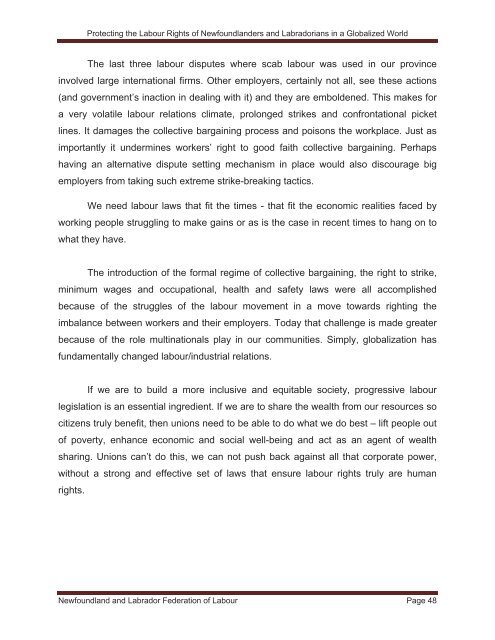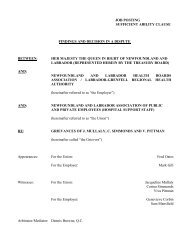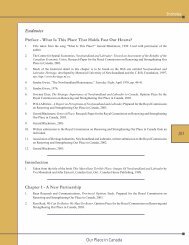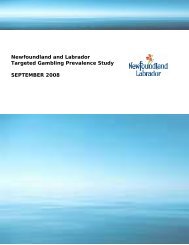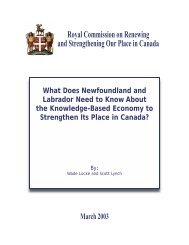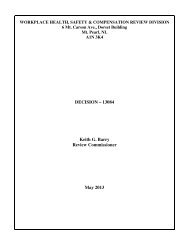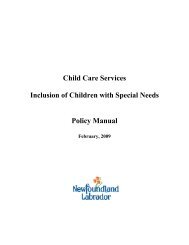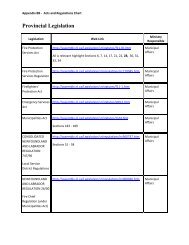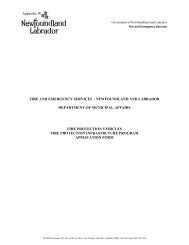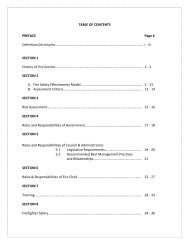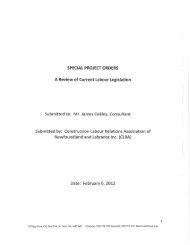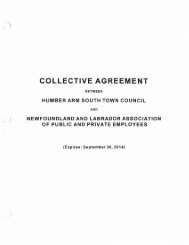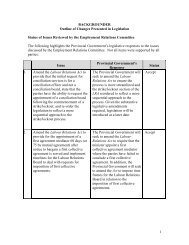January 7, 2011 - Government of Newfoundland and Labrador
January 7, 2011 - Government of Newfoundland and Labrador
January 7, 2011 - Government of Newfoundland and Labrador
You also want an ePaper? Increase the reach of your titles
YUMPU automatically turns print PDFs into web optimized ePapers that Google loves.
Protecting the Labour Rights <strong>of</strong> <strong>Newfoundl<strong>and</strong></strong>ers <strong>and</strong> <strong>Labrador</strong>ians in a Globalized World<br />
<br />
The last three labour disputes where scab labour was used in our province<br />
involved large international firms. Other employers, certainly not all, see these actions<br />
(<strong>and</strong> government’s inaction in dealing with it) <strong>and</strong> they are emboldened. This makes for<br />
a very volatile labour relations climate, prolonged strikes <strong>and</strong> confrontational picket<br />
lines. It damages the collective bargaining process <strong>and</strong> poisons the workplace. Just as<br />
importantly it undermines workers’ right to good faith collective bargaining. Perhaps<br />
having an alternative dispute setting mechanism in place would also discourage big<br />
employers from taking such extreme strike-breaking tactics.<br />
We need labour laws that fit the times - that fit the economic realities faced by<br />
working people struggling to make gains or as is the case in recent times to hang on to<br />
what they have.<br />
The introduction <strong>of</strong> the formal regime <strong>of</strong> collective bargaining, the right to strike,<br />
minimum wages <strong>and</strong> occupational, health <strong>and</strong> safety laws were all accomplished<br />
because <strong>of</strong> the struggles <strong>of</strong> the labour movement in a move towards righting the<br />
imbalance between workers <strong>and</strong> their employers. Today that challenge is made greater<br />
because <strong>of</strong> the role multinationals play in our communities. Simply, globalization has<br />
fundamentally changed labour/industrial relations.<br />
If we are to build a more inclusive <strong>and</strong> equitable society, progressive labour<br />
legislation is an essential ingredient. If we are to share the wealth from our resources so<br />
citizens truly benefit, then unions need to be able to do what we do best – lift people out<br />
<strong>of</strong> poverty, enhance economic <strong>and</strong> social well-being <strong>and</strong> act as an agent <strong>of</strong> wealth<br />
sharing. Unions can’t do this, we can not push back against all that corporate power,<br />
without a strong <strong>and</strong> effective set <strong>of</strong> laws that ensure labour rights truly are human<br />
rights.<br />
<strong>Newfoundl<strong>and</strong></strong> <strong>and</strong> <strong>Labrador</strong> Federation <strong>of</strong> Labour Page 48


